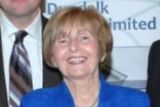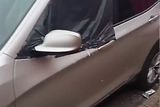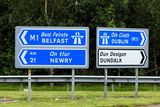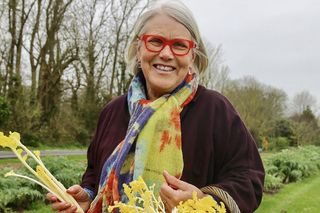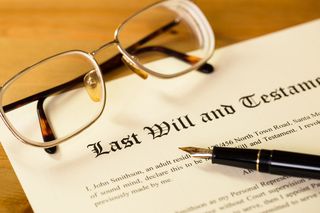Documentary showing Dublin man living with rare genetic disease selected for Cannes Film Festival
‘Invisible Interviews: Graham’s Story’ documents Graham Kirk’s life with Niemann-Pick disease
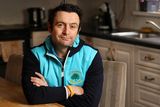
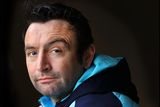
A documentary showcasing how a Co Dublin man lives with a rare disease has been selected for the prestigious Cannes Film Festival.
Rush native Graham Kirk was diagnosed with the genetic condition Niemann-Pick disease type C in 2010. He received his diagnosis after his sister, Paula, had the same disease.
“I got diagnosed because my sister had it. She was drastically incapacitated with it. At the end she couldn’t sleep, she suffered pneumonia and passed,” Mr Kirk said.
“I’m fortunate that I’ve been able to see what has happened to her and done the opposite.”
Invisible Interviews: Graham’s Story was produced by the Niemann-Pick UK (NPUK) charity. It was also nominated for a Smiley Charity Film Award in March.
“It’s great. What we’re trying to do is just ring as many bells and shout as loud as we can at the moment to raise awareness of the disease,” Mr Kirk said.
“I’m so lucky to have my support network of family and friends. And the charity itself, to be associated with any charity, I’m glad it’s this one.”
The documentary was filmed with just one camera at Mr Kirk’s home and has gone up against bigger, more expensive productions at every turn on the way to Cannes.
“I never thought we’d even get this far. There was a bit of traction from the Smiley Awards last month and now it’s been included in Cannes,” he said.
“We didn’t really expect to be up with the high-rollers of the Cannes Film Festival and the competitors in the category are from Japan, Italy.
“Huge names that would be head and shoulders above us in terms of what they can afford to put into making a movie.
Read more
“What we went for in the end – and what budget drove in the end – was a fly-on-the-wall documentary, a face-to-face of me being able to share my story with the camera and the world, hopefully.”
Mr Kirk has taken a number of steps to reduce stress in his life to help manage Niemann-Pick. He no longer works, has taken on a healthier lifestyle since his diagnosis and is still able to go to the gym.
“Nothing is the same for each patient,” he said.
“My diagnosis is bad, yes, and I have Niemann-Pick, but I know there’s patients out there that every day they wake up they have to wee into a bag, bring a bag with them, bring an oxygen tank with them, get into a wheelchair.
“There are severe cases, whereas I am very fortunate.”
Niemann-Pick can lie dormant in the body for years before being brought on by a trigger. For Paula, the stress of sitting the Leaving Cert revealed the condition.
“From there everything was downhill. Her mobility, her hand-eye co-ordination, everything was just not there,” Mr Kirk said.
“Whereas I’ve been lucky enough to see all of that and fight the good fight.”
Getting treatment and advancing research for rare diseases like Niemann-Pick can be difficult, Mr Kirk said.
“Treatment is an issue across the board for rare diseases, not just Niemann-Pick. Ireland isn’t really a major player in the development of drugs, we don’t look at developing drugs for rare diseases because they’re so expensive.
“It’s a battle for the charity to get funding, it’s always being knocked back because it is such a rare disease.”
The documentary has done a great deal to raise awareness, reaching more than 165,000 views globally on TikTok alone.
“With the condition, you’re just looking at exposure and trying to raise awareness as much as possible, we’re not looking at making money off anything like this. It’s started from a very small base and grown exponentially.”
Niemann-Pick affects around 70 or 80 people in the UK and there are just four or five diagnosed cases in Ireland. Niemann-Pick type C affects one in 120,000 people, but NPUK has said that may be an underestimation.
Though he now uses hearing aids, Mr Kirk said he feels “guilty” when he attends the yearly NPUK conference and sees how the disease is impacting other people.
“You’re given a badge at the start – pink for patients, green for volunteers and blue for family members. I sat down and another lady said to me, ‘I think you have the wrong badge’. That’s sort of complimentary but it’s also sort of embarrassing.
“You do come back from the conference and feel a bit guilty because you’re so well and everyone around you is struggling along. I feel sad for the parents with kids in wheelchairs, going into care and respite. They don’t have much time left with them and they know that as well.”
Mr Kirk is an ambassador for the International Niemann-Pick Disease Registry (INPDR), an initiative aimed at documenting how the condition physically progresses involving both patients and doctors.
The work of the INPDR has been crucial in raising awareness and understanding of Niemann-Pick due to the rarity of the disease, creating an international effort to push research forward and improve clinical care.
Join the Irish Independent WhatsApp channel
Stay up to date with all the latest news





